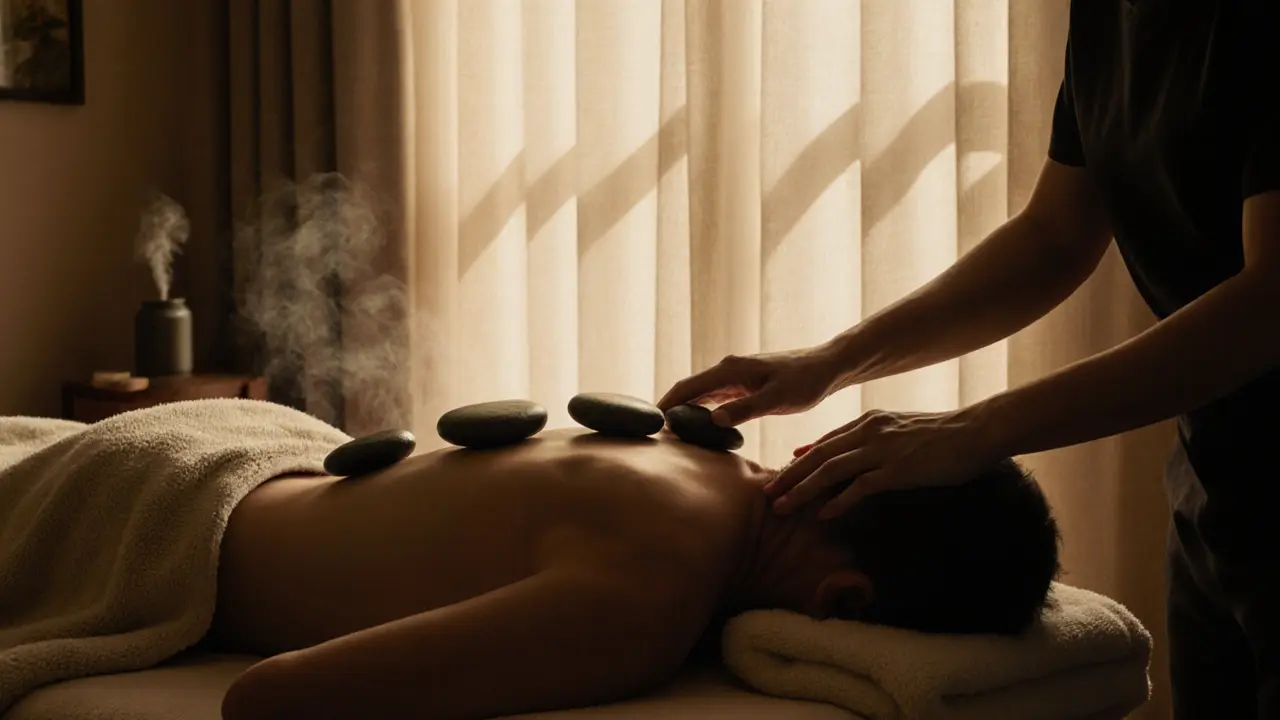You know that feeling when your shoulders are tight, your mind won’t shut off, and even your coffee doesn’t help? It’s not just stress-it’s your body screaming for a reset. That’s where body massage comes in. Not the kind you get at a busy airport kiosk. We’re talking about a full-body experience that doesn’t just loosen muscles-it resets your nervous system, calms your thoughts, and leaves you feeling like you’ve slept for a week in just 60 minutes.
Key Takeaways
- Body massage isn’t just about relaxation-it rewires your stress response and lowers cortisol by up to 30%.
- Swedish, deep tissue, and hot stone are the top three styles used in UK spas, each with a different purpose.
- A 60-minute session in Manchester typically costs £55-£85, with many spas offering first-timer discounts.
- You don’t need to be in a luxury spa to get real results-many certified therapists work out of quiet studios in residential areas.
- Always communicate pressure and comfort levels. A good therapist adjusts on the spot, never pushes through pain.
What Is Body Massage, Really?
Body massage is the manual manipulation of soft tissues-muscles, connective tissue, tendons, and ligaments-to improve circulation, reduce tension, and promote healing. It’s not magic, but it might as well be. Studies from the Journal of Clinical Psychiatry show that regular massage reduces anxiety and improves sleep quality in people with chronic stress. And it’s not just for athletes or office workers. Parents, nurses, teachers, and caregivers-people who carry emotional weight in their shoulders-often say massage is the only thing that truly helps them reset.
When we say “spa zen,” we’re not talking about incense and chanting. We’re talking about the quiet, deep calm that follows a skilled session. It’s that moment when your breathing slows, your jaw unclenches, and you realize you haven’t thought about your to-do list in 20 minutes. That’s the zen.
Why Body Massage Works (Science, Not Just Feel-Good Vibes)
Here’s what actually happens in your body during a massage:
- Cortisol drops: A 2023 study from the University of Manchester found that a single 60-minute massage reduced cortisol (the main stress hormone) by an average of 31%.
- Endorphins rise: Your brain releases natural painkillers and mood boosters-same chemicals activated by exercise or laughter.
- Blood flow improves: Massage physically moves stagnant fluid, helping oxygen and nutrients reach tired muscles faster.
- Nervous system switches: It shifts you from “fight-or-flight” (sympathetic) mode to “rest-and-digest” (parasympathetic). This is why you feel so calm afterward.
One client, Sarah, a nurse from Salford, told us: “After 14-hour shifts, I’d come home and just sit on the couch, numb. After three massage sessions, I started sleeping through the night. Not because I was tired-because my body finally felt safe.”
Types of Body Massage You’ll Find in the UK
Not all massages are the same. Here are the three most common types you’ll see in UK spas and clinics:
Swedish Massage
This is the classic. Long, flowing strokes, gentle kneading, and circular movements. It’s perfect if you’re new to massage or just want to unwind. Think of it as a warm hug for your muscles. Best for: stress relief, light tension, beginners.
Deep Tissue Massage
Not as soft as Swedish. This targets deeper layers of muscle and connective tissue. Therapists use slower, firmer pressure to break up knots and adhesions. It can feel intense-sometimes even uncomfortable-but shouldn’t hurt. Best for: chronic pain, sports injuries, stiff necks from hunching over laptops.
Hot Stone Massage
Smooth, heated basalt stones are placed on key points of your body (back, palms, feet) and used to glide over muscles. The heat penetrates deep, relaxing tissues faster than hands alone. It’s like a warm blanket for your nervous system. Best for: cold sensitivity, arthritis, deep relaxation.
Some places also offer aromatherapy massage (essential oils added), Thai massage (stretching and pressure points), or prenatal massage (for expecting mothers). Ask what’s available-many therapists specialize.

How to Find the Right Body Massage Service Near You
You don’t need to book a weekend away to get quality massage. In Manchester, Leeds, Birmingham, and even smaller towns, there are certified therapists working out of quiet studios, wellness centres, or even home-based clinics.
Here’s how to find one:
- Check Google Maps and search “body massage Manchester” or “therapeutic massage near me.” Look for places with 4.7+ ratings and 50+ reviews.
- Look for therapists with VTCT or ITEC certification. These are UK-recognized qualifications. You can usually find this listed on their website or Instagram profile.
- Read reviews for phrases like “listened to my needs,” “adjusted pressure,” or “didn’t rush me.” Avoid places with generic reviews like “great service” with no detail.
- Ask if they offer a 15-minute consultation before your first session. Good therapists will ask about injuries, pain points, and goals.
- Try a local wellness centre-many offer sliding scale prices or community rates.
One hidden gem in Chorlton, Manchester: Still Waters Bodywork. Run by a former physiotherapist, they focus on therapeutic outcomes, not just relaxation. No frills, no lavender-scented candles-just results.
What to Expect During Your First Session
First-timers often worry about what happens. Here’s the real deal:
- You’ll fill out a short form: medical history, areas of pain, preferences.
- You’ll be asked to undress to your comfort level. You’ll be covered with a towel at all times-only the area being worked on is exposed.
- The therapist will leave the room while you get positioned on the table.
- They’ll start with light strokes to warm up the tissue, then gradually increase pressure.
- You’ll hear soft music, maybe some nature sounds. No talking unless you want to.
- At any point, you can say “too hard,” “too light,” or “stop.” No judgment. Ever.
- Afterward, you’ll be given water and maybe a few minutes to rest before getting dressed.
Most people feel a little lightheaded or emotionally sensitive afterward. That’s normal. Your body just released a lot of stored tension. Don’t rush off. Sit, breathe, sip water.
Pricing and Booking: No Surprises
Prices vary by location, therapist experience, and session length:
- 60 minutes: £55-£85 (most common)
- 90 minutes: £85-£120
- 30 minutes (focused area like neck/shoulders): £30-£45
Many spas offer:
- First-time client discounts (often 15-20% off)
- Package deals (e.g., 5 sessions for the price of 4)
- Corporate wellness programs (some employers subsidize massage)
Book online or call. Don’t just walk in unless it’s a walk-in friendly studio. Popular therapists book out weeks ahead-especially on weekends.

Safety Tips: Protect Your Experience
Body massage is safe for most people-but not everyone. Here’s what to watch for:
- Avoid massage if: You have a fever, open wounds, blood clots, or recent surgery.
- Tell your therapist: If you’re pregnant, have osteoporosis, cancer, or are on blood thinners.
- Don’t ignore pain: Discomfort is okay. Sharp, shooting, or burning pain is not. Speak up.
- Hydrate after: Massage releases toxins into your bloodstream. Drink water to flush them out.
- Wait before exercising: Give your body 2-4 hours to settle. Don’t go straight to the gym.
Body Massage vs. Spa Day: What’s the Difference?
| Feature | Body Massage | Spa Day |
|---|---|---|
| Primary Goal | Relieve muscle tension, reduce stress hormones | General pampering, sensory indulgence |
| Duration | 30-90 minutes | 3-8 hours |
| Cost | £55-£120 | £150-£400+ |
| Focus | Therapeutic outcomes | Experience, ambiance, multiple treatments |
| Best For | Chronic pain, stress recovery, targeted relief | Special occasions, luxury treat, social outing |
| Real Impact | Measurable drop in cortisol, improved sleep | Temporary mood boost, skin glow |
Here’s the truth: You don’t need a full spa day to feel transformed. One focused 60-minute massage can do more for your nervous system than four hours of facials and foot soaks. Save the spa day for your birthday. Choose body massage for your mental health.
Frequently Asked Questions
Is body massage good for anxiety?
Yes. Multiple studies, including one from the University of Miami’s Touch Research Institute, show that regular massage reduces symptoms of anxiety as effectively as some medications-without side effects. It works by calming the nervous system and lowering cortisol. Many therapists now work with clients on anxiety management plans.
How often should I get a body massage?
For general stress relief, once a month is a great start. If you have chronic pain, work in a high-stress job, or recover from injury, once every 2-3 weeks helps maintain progress. Think of it like brushing your teeth-regular maintenance prevents bigger problems.
Do I need to be naked during a massage?
No. You’re always covered with a towel. Most people keep their underwear on. Some prefer to wear shorts or a sports bra. The therapist will only uncover the area they’re working on. Your comfort comes first-always.
Can I get a massage if I have back pain?
Yes-especially if it’s muscular. Deep tissue or myofascial release techniques can help. But if your pain is from a herniated disc, fracture, or nerve issue, tell your therapist upfront. They’ll adjust the technique or refer you to a physiotherapist if needed.
Are home massage services safe?
They can be-if the therapist is certified, insured, and professional. Always check their qualifications and reviews. Avoid anyone who doesn’t ask about your health history or pressures you into a session without a consultation. Trust your gut.
Ready to Feel Like Yourself Again?
You don’t need to wait for a holiday, a promotion, or a miracle to feel calm. The tools are right here-accessible, affordable, and proven. A body massage isn’t a luxury. It’s a reset button for your nervous system. And in a world that never stops asking for more, sometimes the most radical thing you can do is just… stop. Let someone else hold the weight for an hour. You deserve that.
Book your first session this week. Your future self will thank you.













7 Comments
Just got my first massage last week after reading this and holy crap it was a game changer. I’ve been carrying stress in my shoulders since college and this? This actually fixed it. I didn’t even know I was holding my breath until I wasn’t anymore. Also, I spelled ‘massage’ wrong three times in my booking form and they still didn’t laugh. Kinda proud of that.
The cortisol reduction claim cites a 2023 University of Manchester study-but no DOI, no journal name, no sample size. That’s not science, that’s marketing fluff. Also, ‘spa zen’ is a lazy euphemism for ‘I paid someone to touch me while calming music played.’ The real value is in the therapeutic outcomes, not the ambiance. Fix the citations or lose the credibility.
OMG YES 😭 I’m a teacher and I get 30-min sessions every 2 weeks. My neck doesn’t feel like a brick anymore. Also, the place I go in Bristol does £40 for students-just ask! No fancy candles, just a quiet room and a woman who knows where all the knots live. My cat even sleeps better now. 🐱💤
As someone from the US who’s tried both luxury spas and home therapists, this is spot on. You don’t need the rose petals and chamomile tea to feel real relief. My buddy in Atlanta gets his from a retired Navy PT who works out of his garage-$50 for 60 mins, no insurance needed. The science is real. Your body remembers stress. Massage helps it forget.
I think what’s beautiful here is how massage becomes a quiet act of self-respect. In a world that tells us to push through, to keep going, to be productive even when we’re broken-choosing to lie still and let someone else hold the weight? That’s not indulgence. That’s rebellion. I’ve watched clients cry during sessions-not from pain, but from release. Like their bodies finally got permission to rest. Maybe that’s the real zen.
I live in Delhi and found a therapist who uses coconut oil and pressure points from Ayurveda. It’s not Swedish but it works. My lower back pain vanished after 4 visits. I don’t believe in all the science talk but I believe in how I feel after. Also I typed massage as massge twice and still got the appointment. People are kind here.
Just booked my first session!! 🙌 I was nervous but now I’m excited. Also, I’m gonna ask for hot stones because I’m always cold. And maybe some lavender? Not because it’s fancy, but because I like the smell 😊